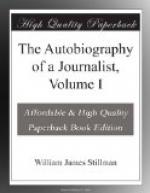As I was in the service of the government I waited on Mr. Adams, the minister, and remained in London until the question was settled, in daily communication with him. He thought the danger of war still great, as Lincoln had not decided to accept the ultimatum, and the English ministry was, in Adams’s opinion, desirous of having a casus belli, or at least a justification for recognizing the Southern Confederacy. That war had not already become inevitable he considered due entirely to the attitude of the Queen, who resisted any measure calculated to precipitate a hostile solution, and had refused her assent to a dispatch demanding the release of the envoys, and worded in such peremptory terms that Lincoln could not have hesitated to repel it at any cost,—an outcome which, in the opinion of Mr. Adams, was what Palmerston, Gladstone, and Lord John Russell wanted. But, on the insistence of the Queen, the offensive passage was struck out, and peace was preserved, though at that moment the reply of our government had not been received, and Adams did not consider that, even in its modified form, the demand of the English ministry might not be rejected. As the crisis was still undecided, I waited until the solution was definite. The favorable reply came by the next steamer. To the peace-loving heart of the Queen mainly, and next to the tact and diplomatic ability of Mr. Adams, the world owes that the war most disastrous possible for the civilization of the west was avoided. Put at rest with regard to this danger, I continued my journey and entered upon my functions as representative of my government at Rome.
I have since heard various versions of this crisis and its solution, but the above is, I believe, substantially the truth. I have heard that the English dispatch was referred to the French Minister of Foreign Affairs, and that he advised against it; but this is impossible. The Emperor of France was more determined even than Palmerston to destroy the United States, if possible, as his Mexican enterprise showed, and we knew from other sources that he was pressing the English government to recognize the belligerency of the South. Day by day I heard from Mr. Adams of the position, and he said to me emphatically that he did not consider the declaration of war impossible until he received the reply of Lincoln to the English ultimatum; and it is impossible that such a transaction as that of the consultation with the French government should have taken place without Adams knowing of it, for his information from the surroundings of the Queen was minute and incessant. He said to me, without the slightest qualification, that the preservation of peace was due solely to the insistence of the Queen, strengthened by the advice of Prince Albert, on the demand for the release of the envoys being made in terms which should not offend the amour propre of the North.




